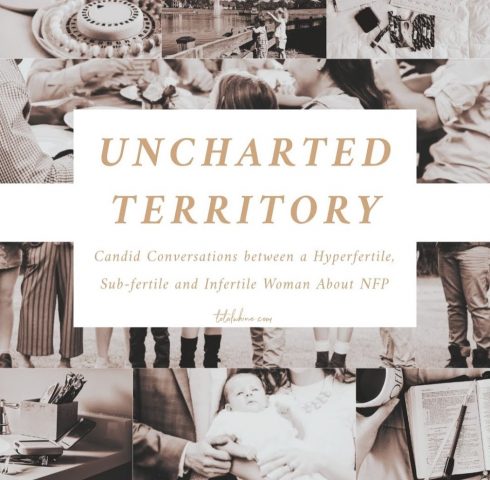GUEST POST FOR NFP WEEK! Blog Series: Uncharted Territory

Msgr. Charles Pope: The Probability of You Existing at All is Almost NON-Existent.
July 20, 2020
Cancel Thy Fathers. Judge Now, Before You Get Judged, by John Zmirak
July 20, 2020
By Emily. Total Whine, July 18, 2020
Uncharted Territory: An NFP Week Series
Following my Life Abundantly series for NFP Week last year, I began engaging constantly in conversations about the NFP lifestyle and Church teaching. Across the board, the most predominate problems seemed to trace back to lack of solid articulation of Church teaching on sex and marriage, a lack of honesty about the NFP lifestyle, and the tendency as a result for couples to compensate for these shortcomings in a myriad of spiritually unhealthy – though understandable – ways.
Through several collaborations, I ended up connecting deeply with two women, Mary Bruno from Taking Back the Terms, and Jennifer Lirette from Surprised by Marriage. We talked at length about Church teaching, the misinformation we’ve encountered that has done tremendous damage, and most importantly, how we can proactively live and work to clarify the truth.
It was through these conversations that this Uncharted Territory series took shape. We began to see how each of our very different family situations could be a means of articulating the truth of Church teaching in a practical way.
It is important as we introduce this series to understand that the Church upholds two primary purposes of sex and marriage: the good/ union of the spouses, and the procreation and education of children. Before we dive into our conversations, we wanted to share verbatim what the Church teachings are on this.
In Canon Law, it states:
“The matrimonial covenant, by which a man and a woman establish between themselves a partnership of the whole of life and which is ordered by its nature to the good of the spouses and the procreation and education of offspring, has been raised by Christ the Lord to the dignity of a sacrament between the baptized.” (Can. 1055 §1.)
The Catechism further articulates the importance of the bond between spouses:
“Conjugal love involves a totality, in which all the elements of the person enter – appeal of the body and instinct, power of feeling and affectivity, aspiration of the spirit and of will. It aims at a deeply personal unity, a unity that, beyond union in one flesh, leads to forming one heart and soul; it demands indissolubility and faithfulness in definitive mutual giving; and it is open to fertility. In a word it is a question of the normal characteristics of all natural conjugal love, but with a new significance which not only purifies and strengthens them, but raises them to the extent of making them the expression of specifically Christian values.” (Catechism of the Catholic Church, 1643)
Later in the Catechism, within the context of articulating the fecundity of marriage, we read:
“By safeguarding both these essential aspects, the unitive and the procreative, the conjugal act preserves in its fullness the sense of true mutual love and its orientation toward man’s exalted vocation to parenthood.” (Catechism of the Catholic Church, 2369)
We can find these dual primary purposes explicitly stated by the USCCB:
“Marriage has two fundamental ends or purposes towards which it is oriented, namely, the good of the spouses as well as the procreation of children. Thus, the Church teaches that marriage is both unitive and procreative, and that it is inseparably both.” (Marriage: Love and Life in the Divine Plan, United States Conference of Catholic Bishops, 2009, Page 11)
Further, Pope Paul VI wrote in Gaudium et Spes,
“Marriage to be sure is not instituted solely for procreation; rather, its very nature as an unbreakable compact between persons, and the welfare of the children, both demand that the mutual love of the spouses be embodied in a rightly ordered manner, that it grow and ripen. Therefore, marriage persists as a whole manner and communion of life, and maintains its value and indissolubility, even when despite the often intense desire of the couple, offspring are lacking.” (Pope Paul VI, Gaudium et Spes #50, 1973)
That these two purposes – union and procreation – are dually primary is vitally important, neither one intentionally superseding or subverting the other, for when this happens, we find a perversion of God’s original design. What is needed then, is a way for married couples to work with God and each other to balance these two purposes practically in their marriage.
This is where NFP comes in.
Within NFP or fertility awareness, the procreative and unitive aspects of marriage are constantly working together, giving couples a framework to practically consider each other’s and their family’s unique needs while respecting the whole person, all under the guidance of the Holy Spirit. It allows all women between puberty and menopause to understand the incredible way God designed their body, to use that information to gain invaluable knowledge about their overall health, and aid in planning their families and promoting deeper intimacy within marriage. Through this practice, parenthood is understood as a gift that at times will present great crosses, and the quantity of children is the result of the faithful, rational and unaltered cooperation of a couple’s fertility with the will of God.
When either the procreative or unitive aspects of sex are subverted or destroyed, such as is the case with those who practice birth control or providentialism (the belief that the unitive function of sex is secondary to procreation), we find a disordering of God’s original design for sex and marriage, and ultimately the undoing of the Christian family.
Jen, Mary and I have completely different families, marriages and life situations. Yet NFP has done the same thing for each of us – helped us grow closer to God and our spouses, expanded our hearts with greater compassion, and given us new eyes to see His limitless creativity. In this series, we hold nothing back about how God’s plan for our lives and our use of NFP points to both the truth and wisdom of Church teaching, and the infinite beauty and complexity of God’s plan for sex.
Over this week, we will share the conversations we’ve had covering six different topics of NFP (underlined conversations are active links):
-
Why NFP should be entirely reframed as fertility awareness
-
On Tuesday – A holistic view of Catholic parenthood, highlighting the spiritual aspects as well as biological
-
On Wednesday – How NFP forces us to carry our unique and individual crosses
-
On Thursday – Why NFP could never limit the power of God over family planning
-
On Friday – What exactly responsible parenthood looks like
-
On Saturday – Abstinence and self-control
Before we dive into each of these conversations tomorrow, we wanted to take a minute to introduce ourselves.
Source: https://totalwhine.com/2020/07/18/uncharted-territory-an-nfp-week-series/




